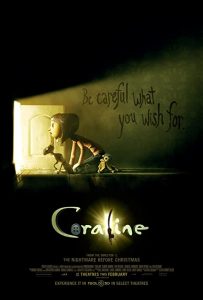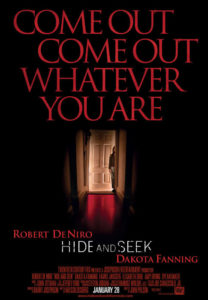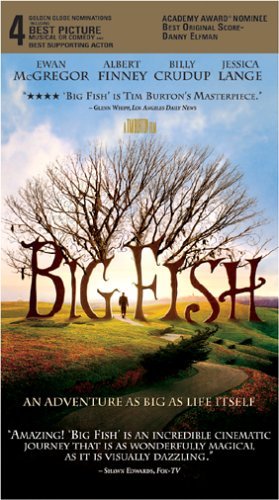 You would think that I’d have already read the long-published book Coraline, by Neil Gaiman. I mean, he’s awesome, right? But by the time I got my hands on a copy, I already knew there’d be a movie coming out, so I’ve put it off. Of course, I kept not seeing the movie, too, which really threw the whole thing out of whack, but Wednesday rendered itself convenient, and now I can at least put the book on my shelf.
You would think that I’d have already read the long-published book Coraline, by Neil Gaiman. I mean, he’s awesome, right? But by the time I got my hands on a copy, I already knew there’d be a movie coming out, so I’ve put it off. Of course, I kept not seeing the movie, too, which really threw the whole thing out of whack, but Wednesday rendered itself convenient, and now I can at least put the book on my shelf.
Coraline is one of those cautionary fairy tales about the dangers of skipping out on the hard parents who have your best interests, in favor of the easy ones who probably have a catch. Unfortunately, the movie failed this test by making Coraline’s parents all too unlikeable, with only a hint of the tough-but-fair paradigm I think (or at least hope) they were trying to portray. Coraline Jones and those parents have just moved into the ground floor of a rental house out in the country, where they can pursue their dreams of writing gardening books, dreams which are made ridiculously implausible by their shared dislike of dirt. Of course, the larger issue is that they’re stressed out by their lack of success and resultantly treat Coraline more like an unwanted distraction than a beloved daughter. All of which would turn into a distressingly heart-rending After-School Special except that there’s a tiny, walled-over door in the rental house’s parlor which leads to a mirror world, through a glass brightly, if you will, where Coraline’s parents dote on her and are excellent cooks, and every tenant and local are present solely to entertain Coraline in a variety of kid-friendly ways, with just the correct hint of faux-danger. In short, every child’s dream come true, much less any child living under the whiff of neglect, and possibly a bit more than a whiff, that Coraline is.
Here’s the good news. Although the cautionary portion of the tale is undercut by her parents actually being kind of harsh, instead of merely not the picture-perfect givers that self-involved kids inevitably want, the fairy tale sense of mounting dread and rich climactic action are spot on. Plus, y’know, 3D, which never seems to suck. Because, of course Coraline’s button-eyed Other Mother is different from how she initially seems. (I distinctly remember mentioning, y’know, fairy tale.) Additionally, the cat is just delightfully… cattish. I can’t say what comparison there is between book and movie, though I understand from Fresh Air that one character was created entirely for the flick. But that cat has all the right notes that makes me certain Neil wrote him first. He just understands cats like nobody’s business.
 The thing is, this was a good movie. Several inevitable games of
The thing is, this was a good movie. Several inevitable games of  I expected to digest this and figure something out in the morning. Only, it all came together in the last ten minutes, and I’m instead compelled to get it out now, before it loses the immediacy. Appreciate that, because I could be listening to the last 15 minutes of Loveline instead, which was my original plan.
I expected to digest this and figure something out in the morning. Only, it all came together in the last ten minutes, and I’m instead compelled to get it out now, before it loses the immediacy. Appreciate that, because I could be listening to the last 15 minutes of Loveline instead, which was my original plan.